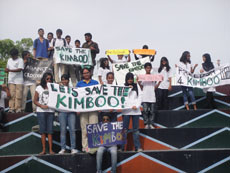As 30 odd students from Billabong High EPSS International school traipsed to Kudakudhinge Bageecha (children’s park) on the southeast side of Male, one might have thought they were on an outing for enjoyment.
But these students were on a mission. To save the crocodile, or ‘kimboo’ as they say in Dhivehi.
Grade eight student Shiman Shiyam had come to see the kimboo before. It is one of the major attractions at the park along with some birds in cages, and tortoises.
“It was sad to see it before also like that, but we never got a chance to do anything about it,” she says.
Shiman is busy painting a banner on the grounds of the park along with five other students, calling for the freedom of the kimboo.
Here and there pockets of students milling about preparing banners. From time to time, some go to take a peek at the kimboo.
The kimboo was caught off an island in Maldives in 1998. When it was first displayed in the little enclosure at the park, you could sometimes barely see it as it was so small the water at the enclosure could completely cover it.
But after 12 years in captivity it has grown to nine feet in length, and the water in the enclosure no longer even covers it. It can stretch its body, but the enclosure is too small for it now.
Billabong High School’s Biology Teacher, Kate Wilson, was out running with a friend when a detour in the park led them to discovering the crocodile.

“We were horrified by the size of the enclosure,” she says.
Calls were placed to Environmental protection Agency (EPA). The EPA told them that they had already tried to rescue the crocodile in conjunction with a Sri lankan outfit, to try and send it to a better place, “but for some reason it didn’t work out.”
Kimboo occasionally makes it into local media and even has his own Facebook page calling for his release, but so far nothing has eventuated.
Kate shared the story with her students, who were very keen to help and do what they could to begin the process of finding the crocodile a better home.
“We got in touch with an international agency in Australia, which rescues crocodiles that are injured or in bad conditions,” she says. The agency is currently holding discussions to see if it is feasible to rescue the crocodile.
To encourage the agency to take action, today the students were making banners and producing a video with messages calling for support.
Shiman is confident kimboo will be rescued.
Aishath Suha, also in grade eight, says she volunteered for the operation ‘because I don’t want to see kimboo suffer.”
She points out the lack of space and says “it will be better off somewhere else in a better habitat.”
Like Shiman, Suha had also come to see the crocodile before and been concerned.
“This is all part of marking World Environment Day, albeit belatedly,” says Billabong’s Principal, David Key.
Billabong High could not mark the day, as it fell on a holiday.
But now, as part of the activities, groups of students are planting 30 trees along the beach front area, and the beach near the tsunami monument.
“This is to create awareness among students about what they can do, and how they can help in contributing positively to preserving the environment,” says David.
Reasons for rescuing kimboo
Banners completed, the students gathered on the steps in the park. Each group of students gave the message they wanted to say for the video.
A group of young boys likened the kimboo’s captivity to “holding a person in a cage, through no fault of his own.”
Most students mentioned the small enclosure as the prime reason for wanting it to be rescued.
“It would be better off in a better home with others of its kind,” was another reason.
Sadly, after 12 years in captivity, the kimboo can most likely never be set free. But for the grade 7, 8, 9 and 10 students of Billabong, the fact it might get a better home is reason enough to try.
Meanwhile the kimboo lies in its enclosure, its powerful jaws wide open, oblivious to the fact that its future might soon change dramatically for the better.